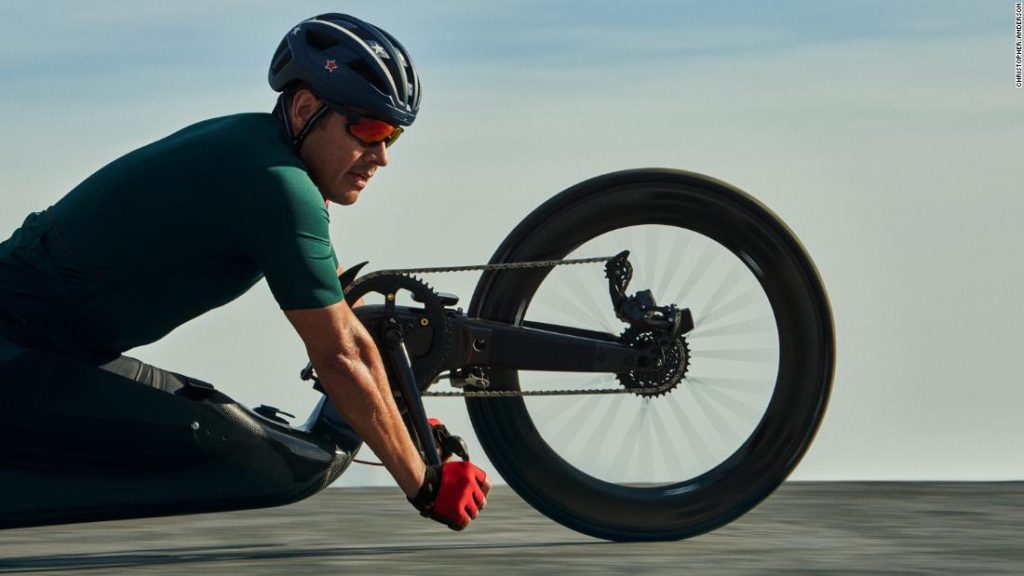That may have been more than 30 years ago, and the bike he rides today may be different to the mountain bike he rode as a kid, but the allure of the sport remains the same.
These days, cycling is also his career. One of the top handcyclists in the world, Sanchez is a six-time medalist across three Paralympic Games and also has multiple world championship titles.
It was in the years following a spinal cord injury, sustained during a motorcycle accident in 2001, that Sanchez discovered handcycling; the impact the sport had on his life was immediate.
“When I first started riding, literally just going around the block was a feat in and of itself,” he says.
“But it made me feel so alive because of the adrenaline and the blood pumping and just the feel-good chemicals of working out.
“It became addictive, but it was all still mostly just the idea of getting out of the house and releasing my frustrations with my broken back and the accident.”
‘The journey, not the destination’
Having joined the US Marine Corps in 1996, Sanchez was in the process of transferring to the Navy as a Navy SEAL at the time of the accident.
“We’re talking about a transition from special operations, kicking doors and hostage rescue type mentalities of military operations to now: you broke your back, you did some permanent damage, you’re never going to walk again,” says Sanchez.
“I mean, the idea of me being competitive at any level at that point wasn’t on my mind at all. It was literally just so I can get out of the house and keep me from going insane.”
But over the years, Sanchez gradually transitioned into racing and was introduced to the US Paralympic team ahead of Beijing 2008.
There, he won gold in the time trial and bronze in the road race. Two Games and four more medals later, he’s now preparing to compete at the Tokyo Paralympics, noting that the way he’s viewed his success has changed over the years.
“I felt so utterly broken and worthless because of my interpretation and perception of my being an individual with a disability who can’t walk, those medals meant I was still a successful person and therefore I was worthy because of those medals,” says Sanchez, reflecting on how he felt after his first Paralympics.
“But now, I no longer contend with that depression and those ways of thinking. My body might be broken per se, but I am not broken. And so now, the medals are more of a testament to the person I’ve become.
“Instead of being attached or identified by my successes, I’m more attached and identified by my capacity to achieve those successes — the journey, not the destination.”
Tokyo will be the next step of the journey, with the Paralympics getting underway on August 24.
As for Sanchez, he’s ready to embrace the situation in the same way he does with most other challenges.
“The notion of me going to Tokyo or even traveling internationally, I don’t really feel threatened by a lot of these things because in my back mind — and this has a lot to do with obviously my military background and special ops mindset — I almost want to throw it at me just to prove to myself that I can contend with it,” he says.
“It’s that very Spartan, go-getter, pit bull sort of mindset. But from a social standpoint, the question is what is ethically, morally most prudent and strategic for resolving and getting past this pandemic as fast as possible … the answer is never clear and it’s never easy.”
He adds that he’s happy to leave it to the International Olympic Committee (IOC) and International Paralympic Committee (IPC) “to be the thinkers, and me to do the action.”
LA 2028
Currently, Sanchez’s schedule involves a ride of between two to three hours, four to five days a week around his home in San Diego County, California.
Aside from being on the bike, his routine also involves other more unusual training aspects, such as taking a cold shower each morning.
“I don’t even touch the hot stick whatsoever … that’s the protocol,” says Sanchez.
“Nobody enjoys taking a cold shower, and so if you learn to manage those thoughts and that experience and that chaos that precedes jumping in that cold shower … you benefit from thought-management.”
The birth of his son in September also means that Sanchez now has to balance training with the emotional pull of being at home: “Sometimes, I have to say, ‘Nope, nope, we got to stick to the plan. We can play with the little guy later in the evening,'” he says.
It’s a conflict of feelings that he will likely have to contend with for a little while longer.
“I would have said that the likeliness that I retire following these Games was a possibility that I was entertaining, especially now that I’ve migrated into fatherhood and family and all that,” he says.
“But certain opportunities have presented themselves to incentivize my possibly competing as far out as the 2028 Games because of the nature of their location in Los Angeles … where the majority of my family is based.”
You may also like
-
Super League: UEFA forced to drop disciplinary proceedings against remaining clubs
-
Simone Biles says she ‘should have quit way before Tokyo’
-
Kyrie Irving: NBA star the latest to withhold vaccination status
-
Roger Hunt: English football mourns death of Liverpool striker and World Cup winner
-
‘Every single time I lift the bar, I’m just lifting my country up’: Shiva Karout’s quest for powerlifting glory

